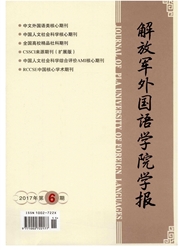

 中文摘要:
中文摘要:
在延时和即时反应范式下,通过对由惯用语和匹配词在4种句法变换条件下构建的320个句子进行句法和语义判断,分析两类语料句法性质的差异,探讨惯用语句法加工的本质。结果表明,句法结构变换影响被试对“合理”句子的判断。被试对惯用语添加副词的句法变换表现出较高的认同性,对其它句法变换认同度较低,同时,句法和语义判断出现分离。结果既支持了惯用语句法加工的特异化模型,又肯定了句法加工的普遍性原则。在不同的反应范式下,惯用语句法加工采取不同的路径,人类对特殊语汇的理解并不仅仅遵循单一通路。
 英文摘要:
英文摘要:
The present study investigated whether the variation of idiom syntax follows the general syntax variation rules or possesses unique variation rules by employing 320 sentences, being composed of forty idioms and forty compared fillers in four different syntax conditions. Experiment 1 explored the acceptabili- ty of sentences containing idioms or invented words in four syntactic versions in semantic and syntactic field within off-line paradigm and we found that there was difference in acceptability. Experiment 2 inves- tigated the acceptability of the same sentences within on-line paradigm and the result showed only when the targets were in the form of passive voice could participants show difference in making judgment. In general, the variation of idiom syntax affects making judgment on syntax and semantics of logical sen- tences, which supported the model of Superlemma, according to which syntactic of idioms was idiosyncrat- ic, but also supported universal principles of syntactic processing.
 同期刊论文项目
同期刊论文项目
 同项目期刊论文
同项目期刊论文
 期刊信息
期刊信息
